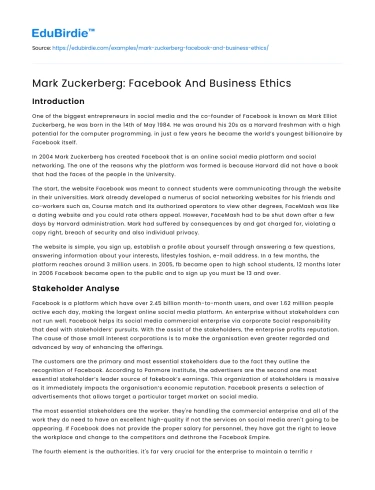Introduction
Mark Zuckerberg, the co-founder and CEO of Facebook, stands at the intersection of innovation and controversy, particularly in the realm of business ethics. Facebook, launched in 2004, revolutionized how people connect and share information globally. However, it has also been embroiled in numerous ethical debates, ranging from privacy concerns to misinformation and its impact on democracy. This essay examines the ethical challenges faced by Facebook under Zuckerberg's leadership and explores the company's responses, including their effectiveness and implications for the future. By analyzing specific case studies and counter-arguments, this essay seeks to evaluate whether Zuckerberg's leadership aligns with sound ethical principles in the business world. Through this exploration, the essay will provide a nuanced understanding of the ethical landscape navigated by one of the most influential tech companies and its enigmatic leader.
Facebook's Privacy Issues and Responses
One of the most significant ethical challenges faced by Facebook is the issue of user privacy. Facebook's business model relies heavily on data collection and targeted advertising, raising concerns about how user data is handled and protected. The Cambridge Analytica scandal in 2018 epitomized these concerns. The data analytics firm harvested personal data from millions of Facebook users without their consent, leading to widespread backlash and regulatory scrutiny. According to a report by The Guardian, this breach exposed the vulnerabilities in Facebook's data protection policies and prompted calls for stricter privacy regulations (Cadwalladr, C., & Graham-Harrison, E., 2018).
Save your time!
We can take care of your essay
- Proper editing and formatting
- Free revision, title page, and bibliography
- Flexible prices and money-back guarantee
In response, Zuckerberg publicly apologized and Facebook implemented several measures to enhance data security and transparency. These included revising privacy settings, introducing data access tools, and improving user consent mechanisms. However, critics argue that these measures were reactive rather than proactive, questioning the genuine commitment of Facebook to safeguarding user privacy. A report by the Electronic Frontier Foundation highlighted that while Facebook has made strides in data privacy, it still prioritizes profit over user protection, reflecting a broader ethical dilemma within tech companies (Electronic Frontier Foundation, 2019).
Despite these criticisms, it is essential to acknowledge the complexities involved in balancing business interests with ethical responsibilities. Facebook's efforts to improve privacy settings demonstrate a recognition of its ethical obligations, albeit driven by external pressure. This case underscores the need for continuous ethical vigilance and proactive measures in tech companies, ensuring user trust and compliance with emerging regulatory standards.
Misinformation and Its Implications on Democracy
Another critical ethical issue associated with Facebook is the spread of misinformation and its impact on democracy. The platform's role in disseminating false information came under intense scrutiny following the 2016 U.S. presidential election. Reports indicated that Facebook was used to spread fake news, influencing public opinion and potentially affecting electoral outcomes. As noted by Allcott and Gentzkow (2017) in the Journal of Economic Perspectives, misinformation on social media can have significant real-world implications, challenging democratic processes and societal trust.
Zuckerberg has publicly acknowledged Facebook's responsibility in combating misinformation and has introduced various measures such as fact-checking partnerships and algorithm changes to reduce the visibility of false content. However, these efforts have been met with skepticism. Critics argue that Facebook's algorithms, designed to maximize user engagement, inadvertently prioritize sensationalist content, including misinformation. This tension between ethical responsibility and business objectives highlights the inherent conflict within Facebook’s operational model.
To address these concerns, Facebook must continue to innovate in its approach to content moderation, balancing freedom of expression with the need for accurate information. This involves investing in technology and human resources to identify and mitigate misinformation effectively. Moreover, collaboration with external stakeholders, including governments and civil society, is crucial in developing a comprehensive strategy to address the ethical challenges posed by misinformation.
Counter-Arguments and Ethical Considerations
While Zuckerberg and Facebook have faced criticism, it is important to consider counter-arguments that highlight the complexities of ethical decision-making in a rapidly evolving digital landscape. Some argue that Facebook, as a platform, cannot be held entirely responsible for user-generated content. This perspective suggests that the onus should be on users and governments to regulate content and ensure ethical standards. Furthermore, Facebook's role in connecting people and promoting free expression is often cited as a positive ethical contribution, fostering global communication and understanding.
Nonetheless, this argument is counterbalanced by the ethical principle of corporate responsibility. As a dominant player in the digital space, Facebook has a moral obligation to ensure that its platform is not used for harmful purposes. This includes implementing robust measures to protect user data and prevent the spread of misinformation. As noted by scholars in the field of business ethics, companies must navigate the fine line between facilitating free expression and safeguarding societal interests (Freeman, R. E., & Velamuri, S. R., 2006).
Ultimately, the debate surrounding Facebook's ethical responsibilities reflects broader societal questions about the role of technology in shaping our lives. As digital platforms continue to evolve, so too must our understanding of the ethical frameworks that guide them.
Conclusion
In conclusion, Mark Zuckerberg's leadership of Facebook presents a complex portrait of business ethics in the digital age. While Facebook has faced significant ethical challenges, particularly in the areas of privacy and misinformation, it has also taken steps to address these issues. However, the effectiveness and sincerity of these measures remain subjects of debate. The ethical dilemmas faced by Facebook highlight the need for ongoing dialogue and collaboration among stakeholders to navigate the rapidly changing technological landscape. As society becomes increasingly reliant on digital platforms, the responsibility of companies like Facebook to uphold ethical standards becomes ever more critical. By learning from past mistakes and proactively addressing ethical concerns, Facebook can contribute positively to society while maintaining its business objectives. Ultimately, the case of Mark Zuckerberg and Facebook serves as a reminder of the intricate balance between innovation, profit, and ethical responsibility in the modern business environment.






 Stuck on your essay?
Stuck on your essay?

